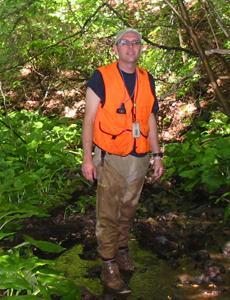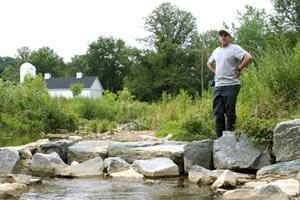Meet EPA Ecologist Paul Mayer, Ph.D.

Studying Stream Restoration and Ecosystem Services
EPA ecologist Paul Mayer, Ph.D. works in EPA's Groundwater and Ecosystem Restoration division where he studies riparian zones (the area along rivers and streams where the habitats are influenced by both the land and water) and stream restoration. Dr. Mayer has also worked as a biologist for the U.S. Fish and Wildlife Service.
- Riparian Zone and Stream Restoration Search EPA Archive
How does your science matter?
My research examines ecosystem restoration projects—looking at how such efforts also restore various kinds of "ecosystem functions," such as absorbing nutrients and preventing erosion. More specifically, my colleagues and I have been looking at stream restoration in urban and agricultural ecosystems. Stream restoration uses various approaches to reconstruct or redesign streams that have been heavily impacted by urbanization, agricultural practices, or past land use.
- Ecosystems Services
- Riparian Zone and Stream Restoration Search EPA Archive
- Effectiveness of Riparian Buffers for Managing Nitrogen Search EPA Archive
With stream restoration, we're looking at nutrient uptake, especially nitrogen. Excess nitrogen is one of the ecological stressors that EPA is most interested in because it can cause human health and ecological problems. High levels of nitrate nitrogen in drinking water prevent your body from taking in oxygen efficiently. My work is helping us learn how to "supercharge ecosystems" and enhance their ability to process excess nitrogen.
If you could have dinner with any scientist, past or present, who would it be and what would you like to ask them about?
I'd say Robert Oppenheimer, the director of the Manhattan Project. It fascinates me that one person collected so many brilliant scientists from all over the world to focus on one project. I'd like to ask him how he struggled with the ethics of developing this horrible weapon that was later used.
When did you first know you wanted to pursue science?
I knew I wanted to be a scientist when I was five years-old. My earliest memory is standing in the front yard of my house with my mom and being fascinated by all the birds flying around us. I asked her what kind of birds they were. I knew then, even though I didn't yet know what a scientist was, that I wanted to know more about the world around me.
Tell us about your background.
I received a B.S. in Zoology from North Dakota State University in Fargo. My undergraduate research focused on raptors in western North Dakota, which was the adventure of a lifetime. Over three years, we camped in the badlands of western North Dakota, hiking around and rappelling down mountains in search of eagles and falcons.
I received an M.S. in Wildlife Biology from the University of Missouri-Columbia where I studied the nesting behavior of an endangered bird called the piping plover. I continued studying endangered birds when I worked for the Fish and Wildlife Service. Later, I earned Ph.D. in Conservation Biology from the university of Minnesota-Twin Cities where my work focused on using chemical and biological indicators of recovery in restored prairie wetlands in South Dakota.

How did you get started at EPA?
I got started as a postdoctoral fellow. I came directly from the University of Minnesota to Ada, Oklahoma, (where I work now) the day after I turned in my thesis. I will soon be relocating to Corvallis, Oregon, where I will work at the EPA's Western Ecology Division.
What do you like most about your research?
For me, it's fascinating to do these large-scale field studies. We collaborate with cities, state agencies, and other resource management agencies that have the capacity, interest and desire to restore a stream. For example, our stream restoration project started in Baltimore where Baltimore County already had a stream restoration project underway. We used that as an opportunity to measure the condition of the stream before and after the restoration.
- Pre-Restoration Geomorphic Characteristics of Minebank Run, Baltimore County, Maryland, 2002-04 Search EPA Archive
If you were not a scientist, what do you think you would be doing?
I can't imagine being anything else! But, if I had to change professions, I'd choose to be Anthony Bourdain, travelling around the world and eating exotic foods.
Any advice for students considering a career in science?
Find a mentor. My mentors helped me realize science was something I wanted to do for the rest of my life. A mentor can help you navigate the maze of unexpected challenges you'll face because he or she has been in the same situation. I feel like I've been helped by a lot of people along the way and I try to do the same for the students whom I mentor now.
